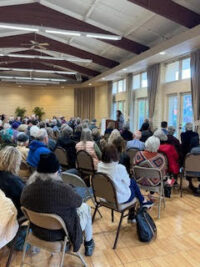
Apple Moth map. Map submitted
On April 20, the second light brown apple moth discovered in Sonoma Valley triggered a local quarantine and an uproar about the possibility of aerial spraying should the infestation prove more extensive. Because of the protests in neighboring counties over the health hazards of the spray, Governor Schwarzenegger has ordered that proper testing be done on the ingredients, and held off the spraying in those areas until August 11 so the testing can be completed. Councilmember Ken Brown brought the issue to the council at the May 7 meeting.
“The City Council’s number one priority is public safety,” said Brown. “Children, seniors, pets, bees, birds–our job is to protect them.” He warned of the dangers of aerial spraying and called for an EIR to study the consequences of multiple months of spraying. “There are other ways [to deal with the pest],” he said, “and I support all the other ways.” A brief discussion among the council members revealed more questions than answers but among the members of the public who rose to speak – often with clipboards overflowing with pages of data – the knowledge was too extensive to be stated in the allotted three minutes per speaker.
The overall message was: 1) the spray has not been tested; 2) nor has the “emergency”–under which the spray was originally ordered–been proved.
Frank Ager, former mayor of Fairfax, stood to salute Linda Kelly (who had been City Manager of Fairfax before coming to Sonoma) and support Brown’s resolution. He said the moth has been here for 10-15 years and has caused no measurable damage. Others noted that the insect is successfully controlled in its native New Zealand and other areas, including islands such as Hawaii.
Councilmember August Sebastiani declined support of the council’s measure to oppose spraying. “You’re barking up the wrong tree. The state of California said they want to spray, so why would they listen to us when we say we don’t want them to spray?” Plus, he added, “This city has earned a reputation for being a difficult one in which to do business. When the City Council chooses to make a motion like this, shooting from the hip by not picking up the phone to ask the vintners and growers their input from what’s the lifeblood of this economy, it just blows me away.”
Councilmember Steve Barbose said this was not a case of the council debating a national question. ”This is a health issue for this community and the people in this community. I think it’s entirely proper for us to stand up for the people who live here.” Given the potential of serious health hazard, he said the council was obliged to weigh in. “The precautionary principle is this,” he said. “When there is shown to be a particular health risk the burden of proof shifts to the proponent to show that it is safe. All we are asking is that we stop the spray until there’s a determination of whether there’s a health risk.”
Councilmember Stanley Cohen said, “The information we have here tonight is overwhelming,” and he supported the motion. Mayor Sanders, whose neighborhood was sprayed with malathaion when she was a child, said even if the room were filled with supporters of the spray, she’d be opposed. “This is a no-brainer. We have to hold the people accountable who have to make this decision, because it sounds like it’s out of our hands.” The council voted four to one to oppose the spray.
On Friday, Senator Carole Migden (D-San Francisco/North Bay) issued a press release praising the Sonoma City Council.
As to the quarantine’s effect in Sonoma Valley, Becky Jenkins, owner of Madrone Vineyard Management, and Clarbec Wines – and whose own fields are now under quarantine – said that she hasn’t received a lot of information, but her understanding is that when the quarantine is lifted and the California Department of Food and Agriculture (CDFA) has declared her fields free of the moth, she will be able to harvest and ship her crops. “I feel confident that the government will come through a process that will certify that our crop is clean and allow our fruit to be sold.” She is open to learning more about the spray issue and said, “More information is always good. We all need to feel comfortable with the treatment that we need to use, and also use common sense about the outcome if we do nothing.”






